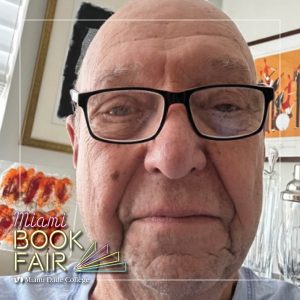
Longtime Friend of the Fair Jim Herron divides his time – and playing tennis – between Miami and New York City, where his wife, Sara Czaja, who specializes in gerontology, is the Gloria and Roland Harriman Professor of Medicine at Weill Cornell Medical College. Before he retired he served as general counsel for Ryder for 25 years.
How did you first learn about Miami Book Fair?
No idea! [laughs] I seem to have always known about it. I’m a book person; I’m chair of The Prologue Society and also a board member of the Brickell Avenue Literary Society, two great book clubs in Miami. I just love books and reading, and I make an effort to always be associated with that in every way I can.
What’s your favorite FOTF benefit?
The greatest thing about Book Fair is meeting great authors. I’m very fortunate that, because of my affiliations, I get to do that all the time. I’m in awe of great writers and people who have something to say.
Have you told other people about the Fair?
Absolutely. I was talking to a very famous author last week and she told me that she was coming to Book Fair for the first time, and I told her how tremendously lucky she was. We’re lucky to have something like it in Miami.
What’s an MBF moment or experience that really stands out for you?
When I introduced Vernon Jordan, I think it was in 2004 or 2005. He had written a book called Vernon Can Read!: A Memoir and he was on the Ryder board and we were very close friends. When he was listed as an author for that year, Penny Thurer knew that I knew Vernon and asked that I introduce him. I loved doing that; it was a real thrill for me.
Tell me about the last great book you read.
For nonfiction, The Invention of Nature: Alexander von Humboldt’s New World by Andrea Wulf. He was probably the most famous scientist and most influential guy in the world no one’s ever heard of. The Humboldt Current, which is one of the most important currents in the ocean next to the Gulf Stream, is named after him; he was the first guy to really explore South America; and he made so many incredible contributions to science – and the book itself is just a revelation about 19th-century thought and philosophy. When I was reading it I bored everybody to tears telling them to “Go buy this book now!” [both laugh]
For fiction it’s Great Circle: A Novel by Maggie Shipstead. It’s about a woman who decides that she wants to fly around the world, but from pole to pole instead of along the equator. It starts with her being dead and knowing that she failed to do that, and then it’s a flashback into her life, which is absolutely amazing and a marvelous description of life in 19th century, early 20th century America. Plus, there’s a book within a book because they decide to make a movie based on her life –
Oh, this is the one where the actress portraying her in the film is sort of experiencing a parallel experience to hers.
Yes; it was shortlisted for the Booker Prize in 2021 and everyone I’ve recommended it to has loved it.
What’s the one book you think every kid (or teen) should have on their bookshelf?
To Kill a Mockingbird. I didn’t realize it didn’t come out until 1960, when I was still in law school. It seems to me it’s been in my consciousness all my life – I saw the play on Broadway, which was wonderful, and the backstory about Harper Lee and Truman Capote is marvelous. But particularly today, with the racial questions and the antisemitism and the absolutely awful issues that we’re dealing with on a daily basis, To Kill a Mockingbird just sets those out so beautifully and so simply and so starkly. I can’t imagine any teenager should enter adult life without having that book in their own consciousness.
If you could have a long, leisurely lunch with any author, living or dead, who would it be and what would you ask them?
Unfortunately, you’re dealing with an English major.
Right back at you.
[both laugh]It would have to be Shakespeare. I went to the University of Missouri, which was not ever known to be a great center of literature, and I had a professor – it’s hard to remember anyone’s name but I remember his very well – Hardin Craig. And it turns out he was sort of near retirement; I think he had taught at some Ivy League schools for a while, and he was really good. I took every Shakespeare course (with him) that I could. So Shakespeare is the guy I’d want to talk to, and I’d ask him, “Did you write the plays?” That question still is being asked over and over again. I’d say, “You’re generally considered to be the greatest writer in the English-speaking world – given your education and life experience, how is that possible?” As far as we know, he had a very simple, basic education. How was he able to deal with questions of philosophy and human emotion and history – how did he do that? I’d love to talk to him and get those answers.
Interview by Elisa Chemayne Agostinho; responses have been edited for space and clarity.